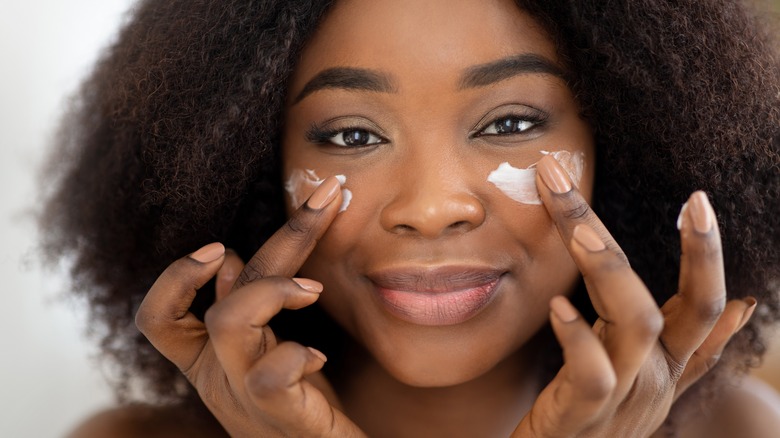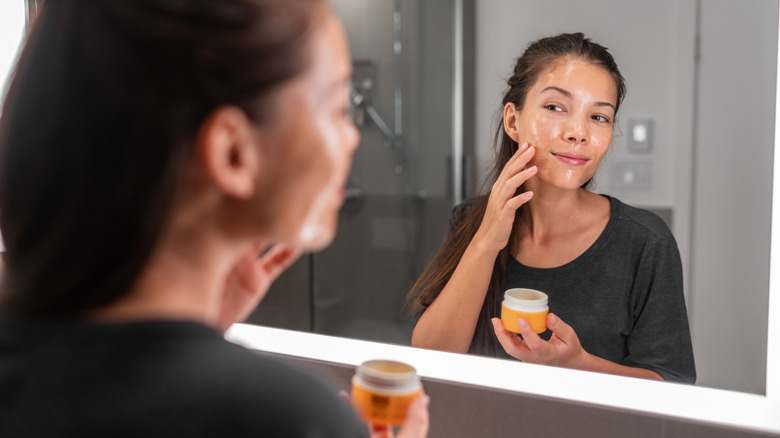What Is The 'Glass Skin' Trend And How Can You Get In On It?
We may receive a commission on purchases made from links.
In the world of skincare, there are so many trending skin types out there. This isn't just about oily or dry, but matte, glazed donut, and even something called dolphin skin. And, yes, people want in on these skin trends because of the unique way they make each complexion look. One of those skin trends is glass skin. If you think this sounds like something that's on par with pure perfection, then you're not far off.
"Glass skin is a term for exceptionally smooth, even-toned, and lustrous skin that's so flawless it has the appearance of glass," skincare blogger and K-beauty expert Jude Chao told Dermstore. "It's simply a clear and elegant way of describing a certain type of enviable complexion." Chao goes on to explain that glass skin isn't just about perfection on the surface, being "extremely smooth, without bumps or rough texture," but also what's going on under that first layer. "Directly beneath the surface, there should be a large amount of water in order to create the moist and lustrous appearance that catches and reflects light," said Chao.
Since this sounds like an ideal skin type, you're probably wondering if you, too, can score a face that resembles glass, and exactly how to do it. According to the experts, anyone can have glass skin, as long as they're willing to put in the commitment to get their complexion to that point, and then continue the work to keep it there.
How does one get glass skin?
The most important part of achieving glass skin is double cleansing. The thinking here is the first wash doesn't remove everything and, because glass skin is the result of skin health, a second cleansing is necessary. "Glass skin is when your skin is at its very healthiest," esthetician Alicia Yoon told Healthline. "In order for skin to appear poreless, luminous, and translucent, so many things have to happen. You can't just be hydrated and look that way. Your skin really needs to be its healthiest in all aspects."
After the double cleansing, it's time to exfoliate. "By removing [dead skin buildup] through exfoliation, you're able to help the healthy skin below, which naturally reflects light, shine through," board-certified dermatologist Geeta Yadav, MD told Byrdie. To do this, turn to the acid almanac: AHAs, BHAs, and PHAs. As Yadav explained, these "help break the bonds securing the dead skin cells to the surface of the skin, sweeping them away and revealing that fresh, new skin."
Next comes hydration. "Dry skin just can't reflect light the way that hydrated skin can," said Yadav. "You want to use hydrating essences, [toners], and serums, possibly several layers of them if you're prone to dry skin." In addition to those products, stick to items that contain ceramides and hyaluronic acid, because as an emollient and humectant, these two work together to maximize hydration. Last, but certainly not least, top it all off with SPF because sun protection is paramount.
How glass skin differs from other dewy trends
Because there are so many skin trends at the moment, it might be difficult to see the difference between glass skin and the other dewy skin trends, like honey, for example. "Glass skin does capture the recent craze for glowy, lit-from-within skin more accurately," makeup artist Ellie Choi told Byrdie. "It's also a more realistic look that women can strive for — honey skin tends to be a bit greasy for some." As Choi further broke it down, it's really a matter of texture versus plumpness. As K-beauty and skincare blogger Sheryll Donerson told Dermstore, the big difference is that honey and dewy came first, but ultimately it's about achieving optimal moisturized skin that's the "very youthful, lit-from-within glow."
Really what we're talking about is just a series of slang terms that are sometimes used interchangeably for different versions of perfect skin. While that can be fun, not everyone is on board. "Am I the only makeup artist or person who gets tired of all the, like, weird names they give to makeup looks to try and make them a trend?" celebrity makeup artist Melissa Murdick asked Business Insider in an article about all these terms. Basically, if you see a skin type you like, make a note of what it's called, then proceed accordingly. If you can get your skin to its healthiest, then it can be glassy, dewy, or as dolphin-y as you want.


